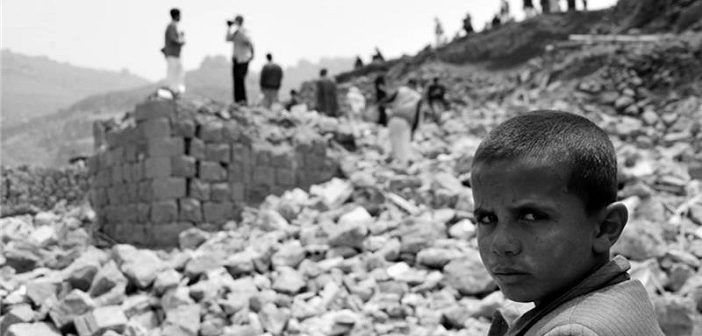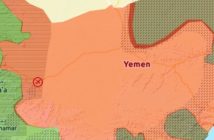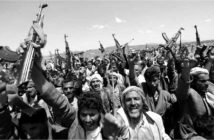In Yemen, the war goes on: catastrophic humanitarian crisis, no foreseeable settlement.
More than 18 months have passed since warfare flared up in Yemen in the wake of Al-Houthis’ storming large swathes of lands in central and south of Yemen including the city of Aden. After the armed group had taken over the capital Sana’a in September 2014, they went on extending their control forcefully. They had ousted the President Abd Rabu Mansour Hadi in January 2015 and forced him to flee the country in March 2015.
Then, Saudi Arabia launched a military operation in a bid to re-instate President Hadi. Arab coalition military intervention has managed to stop Al-Houthis-Saleh alliance’s forces advancement in the southern regions. Later on, Hadi’s government troops have driven Al-Houthis militias out of Aden and pushed Al-Qaeda’s militants and other Jihadist groups out of Al-Mukala, the central city of Hudramout governorate and of the cities of the Abyan governorate. Security situations relatively improved in the regions where Hadi’s forces have taken over.
Recently Hadi’s troops backed by the Saudi-led Arab coalition could open new frontline-battles against Al-Houthi-Saleh alliances’ forces in the northern part of the country, mainly in the area of Al-Boq’a of the governorate of Sa’ada, Al-Houthis’ stronghold. Without underestimating the significant advancements made by Hadi’s troops in the northern frontline-battles, the war has come to stalemate. Several months have already passed since frontline-battles approached the suburbs of the capital Sana’a, however, there are no real signs that indicate that an imminent major military operation may bring about significant progress or intend to recapture the capital from Al-Houthi and Saleh.
Moreover, the Arab coalition’s recent airstrikes, which targeted a mourning hall in the capital Sana’a has made the battle for Sana’a more difficult. The aerial attack on the mourning hall where Al-Rowishan family members were receiving condolences resulted in a massacre, some 150 persons were killed and about 500 more wounded. The casualties included a number of high rank and influential politicians and military figures. Most notable of all is the mayor of the capital Sana’a, Mr. Abdul-Qader Hilal, and the commander of the Reserve Troops- earlier were known as Republican Guards – Major General Ali Al-Ja’fi. Mr. Hilal was a widely respected person and enjoyed significant popularity as an open-minded and judicious person. Meanwhile, General Al-Ja’fi, was famous as a professional military commander with good track record that qualified him to undertake the command of the well-trained and equippedRepublican Guards, the strongest Yemeni troops that used to be under the command of the ex-President Saleh’s son, Ahmed Ali.
Some influential tribal sheikhs were also killed in the incident which was strongly and widely condemned at the national, regional and international levels. Therefore, more pressures were mounted on the Saudi-led coalition warplanes that frequently carried out air strikes and don’t take civilians’ safety into account so that might be classified as war crimes according to claims by international human rights organizations such Amnesty International.
The aerial attack struck a mourning gathering of the Khawlan tribe, one of the largest Yemeni tribes, with its seven branches that stretched around the capital Sana’a. These tribes’ lands stretch from the battle fields in Serwah of the Marib governorate and Al-Baida governorate into the suburbs of the capital city of Sana’a. The Khawlan sub-tribes are also scattered along the highway from Marib to Sana’a. That means securing Khawlan tribesmen support to a military operation by Hadi’s troops is vitally important.In the wake of the tragic hall incident securing such support is obviously more difficult. Saudi Arabia and the Arab coalition acknowledged the bombing, however, they put the blame on the Yemeni parties. It was a reckless action, which has played into the hands of the Al-Houthi-Saleh alliance.
Meanwhile military operations have almost come to standstill, the humanitarian situation is increasingly deteriorating, mainly in the health sector. The medical organizations and officials highlighted for the first time an outbreak of some pandemics like Cholera, which was last detected in Yemen in the 1970s. Several Cholera cases were documented in the city of Sana’a, and the coastal cities of Tehama, Taiz and Aden. Though government forces are in control in Aden, basic services such as electricity and sanitation are still very poor.
However, the humanitarian situation seems to be seriously deteriorated in the coastal area of Tehama under Al-Houthi and Saleh’s forces control. Living conditions are really catastrophic and a starvation nightmare is closely looming there, with severe shortages of food and medical care almost missing.
Since Al-Houthis and Hadi’s authorities have proved unable to pay salaries of approximately one million and two hundred thousand of the government’s employees in the civil and military sectors, people’s living conditions have further deteriorated and suffering is on the rise.
The government has already stated that it is committed to pay the salaries of all employees after it has decided to relocate the Yemeni Central Bank to Aden, the temporary capital. The government argues that the Central Bank was under the control of the putschists in Sana’a, so that should no longer be tolerated. The Central Bank has already failed to pay salaries, moreover, it has drained almost all internal and external reserves, it has also supported the State with more than eight billion dollars as loans in form of treasury bonds and arrears from local banks.
The government’s move is as usual still mismanaged and lethargic. Meanwhile the Al-Houthi-Saleh alliance has appeared to be powerless and acted indifferently. While, Al-Houthis’ leader called for donating to the Central Bank, Saleh hasn’t made any comment on this issue. Apparently, they have put their hands on the remaining available cash so as to fund their war activities, given that they have been denied most of the financial resources, mainly oil revenues and other sources that shall go to the internationally legitimate government. They initially announced openly their opposition to Hadi’s decision to move the Central Bank to Aden.
Their probable rejection to deal with the Central Bank in Aden may mount pressures against them by the state’s employees and ordinary people for their failure to pay salaries. Particularly, as the legitimate government has announced publically that it is intending to pay all employees and it has commenced to pay salaries in the regions under its control. Though this process has been so sluggish so far because of the shortage of liquidity. The government procedures about printing currency abroad were also belated.
Against this background, prospects of any political settlement seems to be very limited. Despite of frequent international initiatives aimed to bring about a solution to the conflict, these good intentions fail to address the main concerns of the parties to the conflict. The last one of these proposals was made by the US Secretary of State, John Kerry.
While Hadi’s government appears to be more likely to succumb to external pressures and more willing to move toward a compromise, the Saudi government is unlikely to sponsor a plan that may keep Al-Houthis and their weapons as a time-bomb on their southern border – under the control of the Islamic Republic of Iran. Thereby, Saudi Arabian leaders believe that any settlement that does not stipulate disarming Al-Houthis will only be a temporary truce during which the group will work on preparing themselves, training their fighters and acquiring more weapons to fight one more war –follow the Hezbollah in this regard.
Since the ex-President Saleh considers all the proposed solutions so far are unfair because they don’t maintain him a place in any settlement. He certainly will act to spoil all suggested proposals. Specially, as his position within the Al-Houthi alliance is increasingly improving since Al-Houthis military capacities are extremely overextended and their human resources seriously drained.
For their own part, Al-Houthis don’t seem to be willing to accept any solution that doesn’t secure them the upper hand in the military and security issues, at least in their own main influence regions. Given that they are well aware of the hostilities they have created with their rival Islamist Jihadists and large number of influential tribal Sheikhs.
In the meantime, the popular resistance forces that are fighting on the side of Hadi’s troops have been unable to unify themselves and formulate their own political blueprint separately from Hadi’s government’s.
The repeated attacks against the US Warship and the American response—in the wake of the assault on the UAE ship—has come to make the situation more complicated. These hostile acts have clearly demonstrated how real a threat such attacks are to the free navigation in the Red Sea, the Bab Al-Mandab Strait and the Gulf of Aden. Concerns about the safety of navigation were reflected in the increasing deployment of the marine military pieces in the region. Despite the Americans openly accusing Al-Houthis of targeting the warship, American response was limited. Yet it is difficult to believe that such hostile military action against the US has nothing to do with certain regional powers, like Iran.
Apparently, Iranian leaders are seeking to mount more pressure through the dossier of the marine passageways so as to assert the Iranian key role in securing marine navigation and to send a message that Iran cannot be excluded from any regional arrangements.




